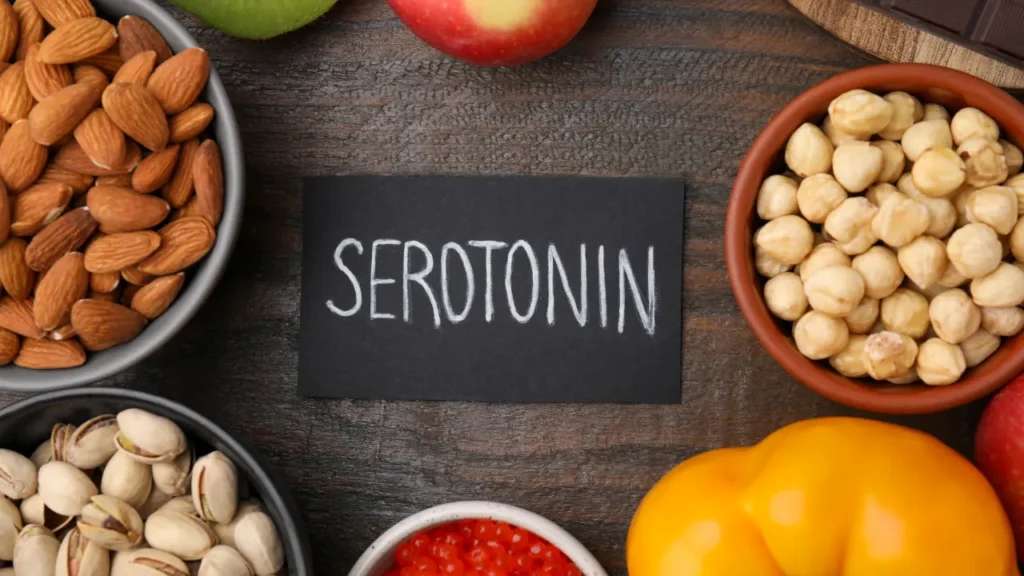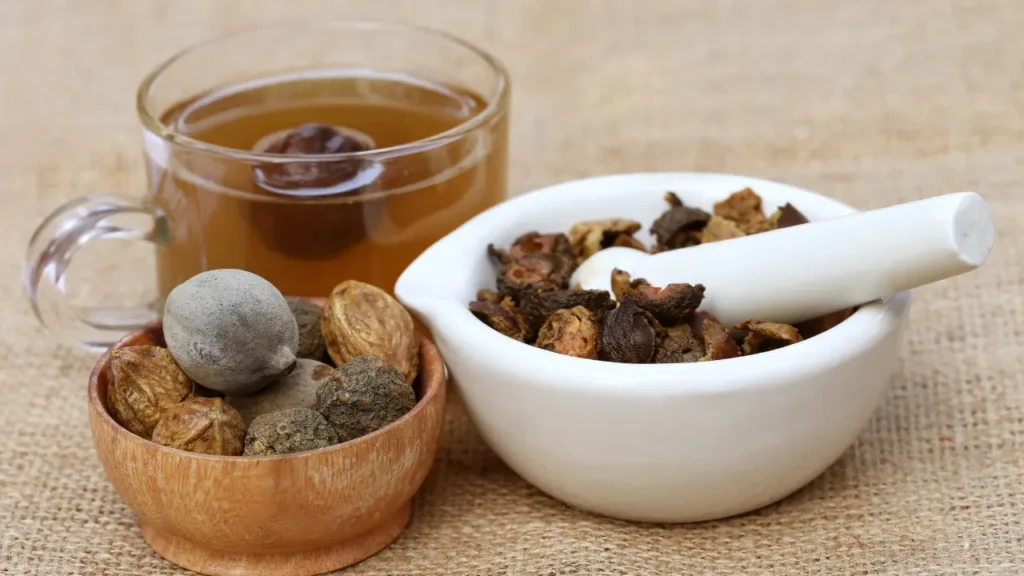Terminalia, a genus of over 100 tree and shrub species in the combretaceae family, has been an important part of traditional medical practices around the world for centuries. These plants, particularly terminalia arjuna, terminalia chebula, and terminalia bellerica, have received substantial research for their potential health advantages, which vary from cardiovascular protection to cognitive enhancement. This article will thoroughly explain the nature, health benefits, appropriate dosage, side effects, potential substance interactions, and responsible use of terminalia extracts as a nootropic supplement.
You May Also Like:
Battle of the Brain Boosters: Brain MD Omega 3 Power vs. Kori Krill Oil Mind & Body
BA JI TIAN: Benefits, Dosage, Side Effects, Drug Interactions, And Other Important Information
Terminalia: Benefits, Dosage, Side Effects, Drug Interactions, and Other Important Information is an original (NootropicsPlanet) article.
Nature of Terminalia
Terminalia species are known for their abundant phyto-chemical content, which includes tannins, flavonoids, terpenoids, and phenolic compounds. These compounds are thought to support the medicinal properties of terminalia extracts. The precise chemical makeup differs between species, contributing to a diverse range of pharmacological benefits.
Health Benefits of Terminalia
Cognitive Enhancement
Interest in terminalia as a nootropic is primarily based on its antioxidant and neuro-protective properties. Oxidative stress plays a pivotal role in cognitive decline, and the antioxidant compounds in terminalia help mitigate this process. For instance, studies have shown that terminalia chebula extract exhibits significant free radical scavenging properties, which can protect neurons from oxidative damage, potentially improving cognitive functions such as memory, alertness, and focus.
Cardiovascular Health
Several terminalia species have been shown to exert cardio-protective properties. Terminalia arjuna, in particular, has been widely studied for its role in improving cardiac function, reducing cholesterol levels, and preventing atherosclerosis. The properties behind these effects are attributed to the presence of bio-active compounds like flavonoids and glycosides, which improve cardiac muscle function and reduce lipid accumulation.

Chemistry of Terminalia
The chemistry of terminalia is complex, encompassing a wide range of bio-active compounds that contribute to its pharmacological properties. These compounds include:
- Tannins: High-molecular-weight polyphenolic compounds that exhibit potent antioxidant and anti-inflammatory properties. Tannins can bind and precipitate proteins, which can contribute to their neuro-protective effects by modulating enzyme activities and reducing oxidative stress.
- Flavonoids: Flavonoids are a diverse group of phytonutrients found in fruits and vegetables. The flavonoids found in terminalia such as quercetin and kaempferol are known for their antioxidant, anti-inflammatory, and vasodilatory benefits. These compounds scavenge free radicals and modulate signaling pathways involved in inflammation and neuronal health.
- Terpenoids: These are lipophilic compounds that can easily cross the blood-brain barrier, exerting neuro-protective effects through antioxidative properties and modulation of neurotransmitter systems.
- Phenolic Acids: Acids such as gallic acid and ellagic acid have been shown to exert antioxidant effects, protecting neurons from oxidative damage.
These phytochemicals work in synergy, contributing to the therapeutic potential of terminalia in enhancing cognitive functions. The specific composition and concentration of these compounds can vary significantly among different species and extracts, influencing their pharmacological effects.
Physiological Properties of Terminalia
The cognitive-enhancing effects of terminalia are attributed to several physiological properties:
- Antioxidant Activity: The phytochemicals in terminalia, such as flavonoids and phenolic acids, neutralize free radicals, reducing oxidative stress in the brain. Oxidative stress is a significant factor in the development of neuro-degenerative diseases and cognitive decline. By mitigating oxidative damage, terminalia extracts help preserve neuronal function and integrity.
- Neuro-protection: Aside from its antioxidative properties, the compounds in terminalia exhibit neuro-protective properties by modulating various cellular signaling pathways. For instance, they can inhibit apoptosis (programmed cell death) in neurons, enhance neuro-genesis (the formation of new neurons), and protect against neuro-toxic agents. This multi-faceted approach helps maintain cognitive function and neural health.
- Modulation of Neurotransmitter Systems: Some studies suggest that terminalia extracts can influence the levels and activity of key neurotransmitters involved in cognition, such as acetylcholine, dopamine, and serotonin. For example, they can inhibit acetylcholinesterase, an enzyme that breaks down acetylcholine, thereby increasing acetylcholine levels and enhancing cholinergic transmission. This effect is particularly beneficial for memory and learning processes.
- Anti-inflammatory Effects: Chronic inflammation is another contributing factor to cognitive decline and neuro-degenerative diseases. The compounds in terminalia, including tannins and terpenoids, have been shown to modulate inflammatory pathways, reducing inflammation in the brain and thereby supporting cognitive health.
- Enhancement of Cerebral Blood Flow: Some terminalia species have vasodilatory effects, which can increase blood flow to the brain. Improved cerebral circulation ensures adequate oxygen and nutrient delivery to brain cells, which is essential for optimal cognitive function and neural health.

Optimal Dosage
The appropriate dosage of terminalia extracts for cognitive enhancement is difficult to determine because it depends on the specific extract, concentration, and the your specific health situation. The extract has been used in the majority of clinical research at dosages ranging from 250 mg to several grams daily. It is critical to consult a healthcare professional before beginning any supplement program, especially when taking extracts with potent biological properties.
Side Effects
While terminaliais usually regarded as safe when used in moderation, some individuals can develop gastrointestinal issues such as nausea, vomiting, or diarrhea, particularly at large doses. Furthermore, due to its potential blood sugar-lowering effects, those with diabetes or who are using anti-diabetic drugs should use caution.
Potential Substance Interactions
Terminalia’s hypoglycemic and cardio-protective properties can interact with some drugs, particularly those used to treat diabetes and heart disease. It can also increase the effectiveness of blood thinners, raising the risk of bleeding. To minimize hazardous interactions, be sure to tell your healthcare practitioner about all drugs and supplements you are on before starting terminalia supplementation.

Best Responsible Use
To ensure the responsible use of terminalia extracts as nootropics, individuals should adhere to the following guidelines:
- Consultation with Healthcare Professionals: Before integrating terminalia into one’s supplement regimen, it is imperative to consult with a healthcare professional, particularly for those with preexisting conditions or those taking other medications.
- Adherence to Recommended Dosages: It is important to always adhere to the dosages recommended by healthcare providers or as indicated on supplement labels, avoiding the temptation to exceed the recommended amount in pursuit of enhanced effects.
- Monitoring for Side Effects: Make sure to remain vigilant for any side effects or negative reactions and report them to a healthcare professional immediately.
- Quality Assurance: Opting for supplements from reputable manufacturers that ensure the purity and potency of their products is crucial.
- Holistic Approach to Cognitive Enhancement: Terminalia should be part of a broader approach to improving cognitive function, including a balanced diet, regular physical activity, and adequate sleep.
Terminalia:
Conclusion
Terminalia offers promising benefits for cognitive enhancement, backed by its rich phytochemical composition and traditional use. However, its responsible use involves understanding the optimal dosage, potential side effects, and interactions with other substances. With ongoing research and clinical studies, the full potential of terminalia as a nootropic supplement continues to unfold, promising to provide a natural alternative for enhancing cognitive function.

References:
- Terminalia Chebula – Uses, Side Effects, and More. Retrieved from:https://www.webmd.com/vitamins/ai/ingredientmono-1696/terminalia-chebula
- Terminalia Clinical Overview. Retrieved from: https://www.drugs.com/npp/terminalia.html
- Revisiting Terminalia arjuna – An Ancient Cardiovascular Drug. Retrieved from: https://www.ncbi.nlm.nih.gov/pmc/articles/PMC4220499/
Important Note: The information contained in this article is for general informational purposes only, and should not be construed as health or medical advice, nor is it intended to diagnose, prevent, treat, or cure any disease or health condition. Before embarking on any diet, fitness regimen, or program of nutritional supplementation, it is advisable to consult your healthcare professional in order to determine its safety and probable efficacy in terms of your individual state of health.
Regarding Nutritional Supplements Or Other Non-Prescription Health Products: If any nutritional supplements or other non-prescription health products are mentioned in the foregoing article, any claims or statements made about them have not been evaluated by the U.S. Food and Drug Administration, and such nutritional supplements or other health products are not intended to diagnose, treat, cure, or prevent any disease.


